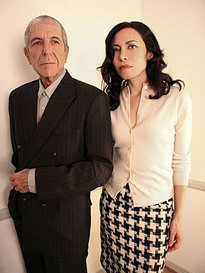Leonard Cohen y Anjani Thomas

Who is this enigmatic singer that has so beautifully salvaged so many of Cohen's darkest and most desperate compositions?
Anjani's professional relationship with Leonard Cohen began in 1984, when she was hired as a background vocalist for "Hallelujah," a song now recognized as one of the greatest in his canon. She was the sole female vocalist and keyboardist on his Various Positions world tour, and continued to record vocals for him on I'm Your Man (1988), The Future (1992) and Dear Heather (2004). But it was not until Blue Alert, that their collaboration achieved a true fusion of both of their creative strengths and talents
Leonard Cohen's discarded lyrics have been given a voice by his partner, Anjani.
Legend has it that Leonard Cohen will write 70 verses to get seven, filling entire notebooks with lyrical variations before he is satisfied with a finished song. So where do all the unused verses go?Well, some of them have ended up on Blue Alert, an album by Cohen's paramour, jazz singer and keyboard player Anjani Thomas. "Leonard was going through journals and other material to send to the University of Toronto archives, and he found the lyric to Blue Alert," says Anjani (who has long since discarded her less exotic surname). The 72-year-old troubadour's live-in partner was so taken by it, she composed a melody and recorded a simple, jazzy version, thus beginning "a gentle exploration" of the journals, in search of other discarded gems. "It wasn't like, 'Let me at 'em!' ", she says laughing. "It was a very careful and thoughtful process. He has so much to examine, he writes every day, but not everything was appropriate to me."The melancholic ballad Never Got to Love You is made up of unused verses from Cohen's apocalyptic drinking classic Closing Time (from 1992's The Future). "He gave me sheets of them and I just took ones I liked, and sometimes I took two lines from one verse and two lines from another, and designated one as the chorus and pieced it together." Other songs were written to order. " 'There was no one after you' was just a line in his journal. I said, 'Man, that's a great title for a song, if you could just write the rest we'll be in business.' He fortunately complied, very graciously and quickly."The result is a quiet, late-night, stripped-back album of poetic ruminations on love, with Anjani's soft, rich, crystal-clear voice lending a meditative sweetness to Cohen's elegant language and dark thoughtfulness."What I strove for was an airtight marriage between music and lyrics," says Anjani. "I hope I didn't interpret. I didn't want you to be driven out of your realm of attention by the voice, which is why there aren't vocal flourishes. The lyrics are so great, they don't need embellishment."She was aided in this by Cohen, who produced the album. "I was cut off from all the tools I have by Leonard. He said 'Sing... but don't.' "Lurking in the bedroom of the hotel suite he has been sharing with Anjani on a promotional trip to London, the dapper, smiling Cohen is keen to lend support to his beautiful companion. "I think both of us were working at the top of our form," he says. "Collaboration is too formal a term to describe the activity, which was an expression of some kind of deep mutuality - some kind of marriage of purpose."Anjani already has two solo albums and is much admired in the US jazz milieu (Madeleine Peyroux has covered three of her songs). She first met Cohen on sessions for his 1984 classic Hallelujah, and toured with him as backing vocalist and keyboard player before becoming romantically involved in 1999. "Eight years together - it's the longest both of us have ever stuck it out, so it's pretty historic." Given that she's a songwriter herself, it can't be easy living with one of the form's legends. "Before, if I wrote three verses, I'd think, 'Gee, that's enough, I've got a song there.' Leonard doesn't think a song is complete until he's got the best of the best. This is why he comes up with 30 or 40 or 70 verses, any one of which I'd be proud to have written. He's made me a more conscientious writer."As for Cohen, who takes several years to write an album, the spontaneity of this collaboration seems to have broken the habits of a lifetime. "The fact that he wasn't writing for himself gave him tremendous freedom," says Anjani. "He was able to come up with things quickly without labouring too much over it." The gorgeous closing waltz, Thanks for the Dance, was composed at the last minute when the record company suggested the album was too short. "And he's still got an extra 14 or 15 verses he didn't use."Cohen has been working on his own album (released later this year), and admirers will be pleased to hear that he has responded to Anjani's more organic recording methods, abandoning the synths and drum machines of recent years to return to the joys of real instrumentation: "He has picked up the guitar again, and swung around to the idea of bringing in people to play." In contrast to Blue Alert, however, the subject matter is unlikely to be the human heart. "No one describes pain, loss, despair and grief as well as Leonard does. But it's not where his intention is right now. The material he is choosing is much more social commentary-driven, which makes this record kind of a miracle, because without it these songs wouldn't have been born."
0 comentarios